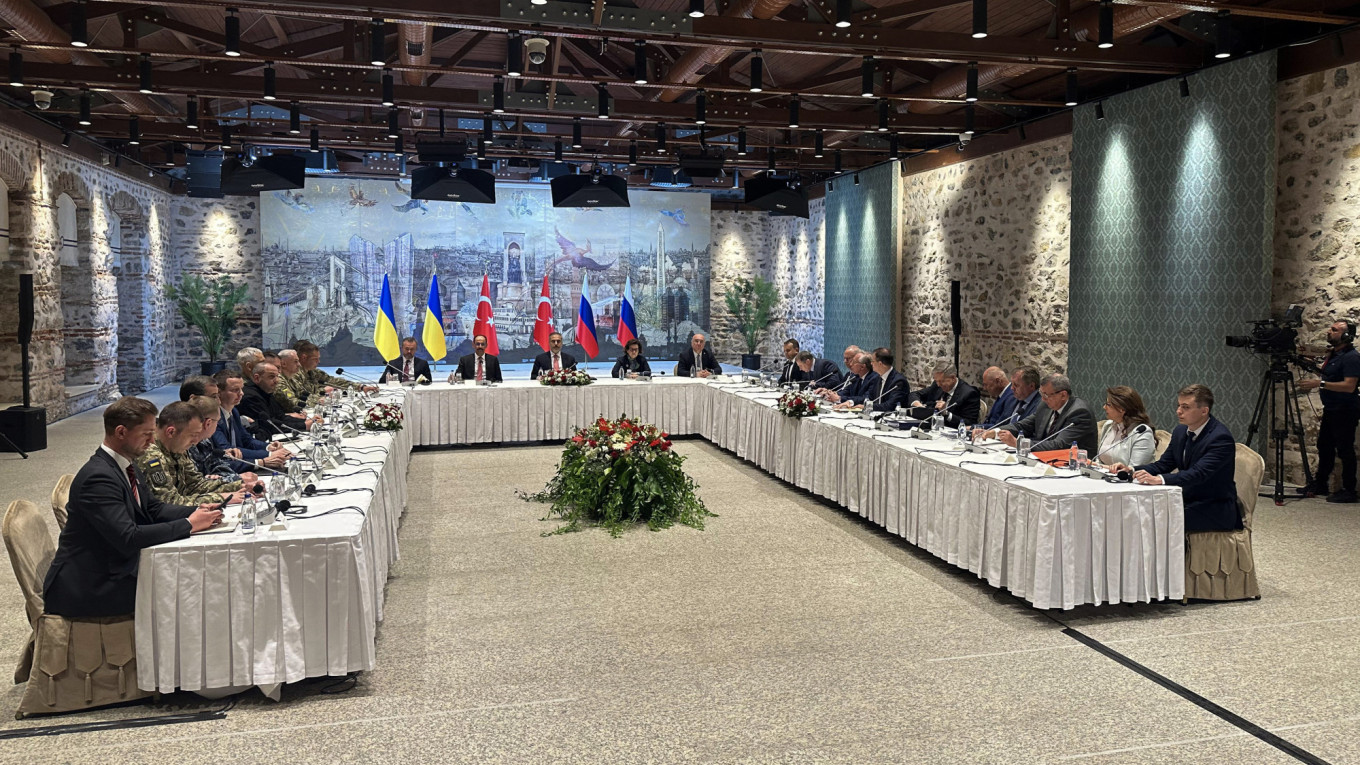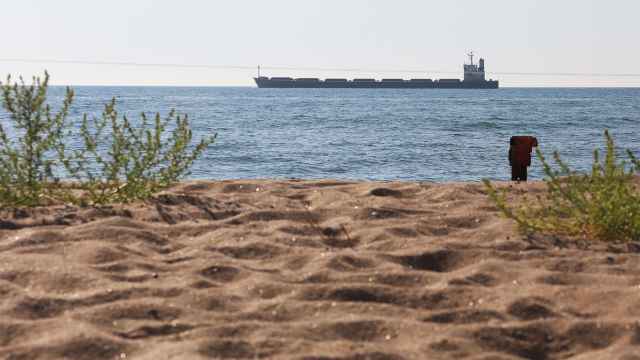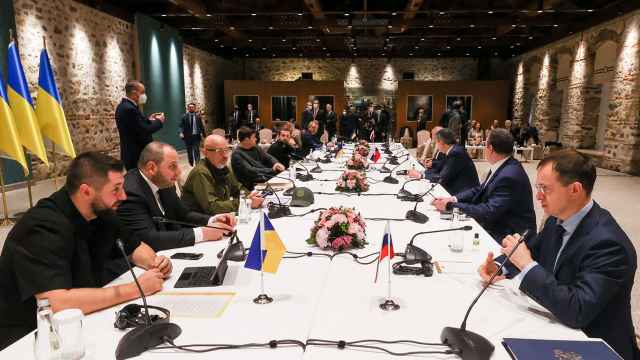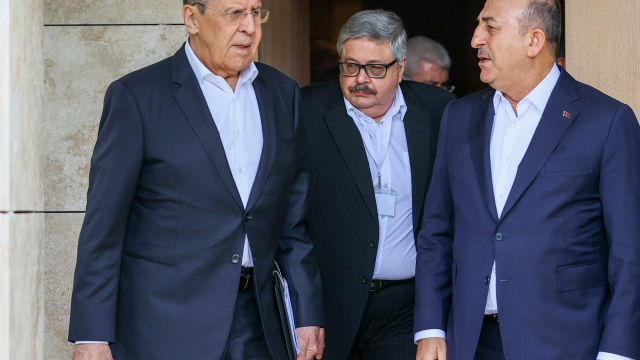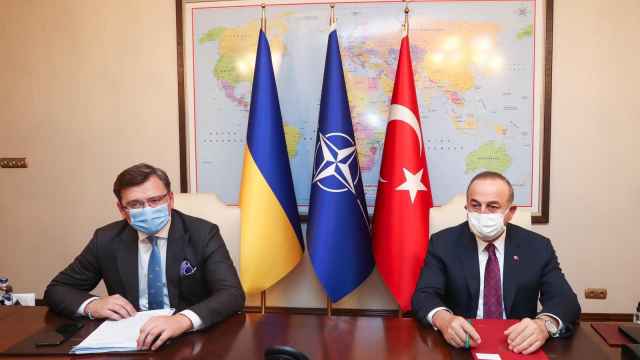Russia and Ukraine have agreed to a major prisoner exchange after concluding their first direct peace talks since early 2022 in Istanbul on Friday, though it remains unclear whether any broader progress was made toward ending Moscow’s war on Ukraine.
Ukraine’s chief negotiator, Defense Minister Rustem Umerov, told reporters after the nearly two-hour meeting at Istanbul’s Dolmabahçe Palace that both sides had agreed to exchange 1,000 prisoners of war each in the near future, without specifying a date.
Kremlin aide Vladimir Medinsky, who President Vladimir Putin tapped to lead Moscow’s delegation, confirmed the deal and said he was “satisfied” with the negotiations. He said that Moscow is ready to continue direct talks with Ukrainian officials, adding that the Kremlin would consider Kyiv’s request for a Putin-Zelensky meeting
Friday’s talks followed a morning meeting between Turkish, U.S., and Ukrainian officials. The Russia-Ukraine session began around 1:30 p.m. local time, opened by Turkish Foreign Minister Hakan Fidan, who urged delegates to agree to a ceasefire as soon as possible.
The session was then closed to the press.
While the prisoner swap marked a tangible outcome of the negotiations, no progress appeared to have been made toward a wider pause in fighting, something Ukrainian President Volodymyr Zelensky and Kyiv’s Western allies have increasingly called for in recent weeks.
A Ukrainian source told Reuters that Moscow’s demands during the talks were “detached from reality” and exceeded anything previously discussed. Among them were ultimatums for Ukraine to withdraw from parts of its own territory in exchange for a ceasefire, as well as other “non-starters and non-constructive conditions,” the source said.
Zelensky, who met with Turkish President Recep Tayyip Erdoğan in Ankara on Thursday, declined to attend the talks after Putin rejected his offer for a face-to-face meeting. Instead, Zelensky sent Umerov to lead Ukraine’s delegation.
Russia’s delegation was headed by former Culture Minister Medinsky, who also led the failed 2022 peace talks. At the time, Kyiv accused Moscow of demanding what it said amounted to capitulation, including recognizing Russian-occupied territories and drastically reducing the size of its military.
Zelensky on Thursday dismissed the Russian negotiation team as “decorative,” arguing they have no decision-making power. Medinsky responded with a brief statement to journalists, saying he and his delegates “have the power to make decisions” and that Moscow sees Friday’s meeting as a continuation of the 2022 negotiations.
Zelensky said the Ukrainian delegation would “try to achieve at least the first steps toward de-escalation, an end to the war — namely a ceasefire,” but added that Russia was not serious about the talks. He suggested new Western sanctions could follow if progress was not made Friday, saying: “We are waiting for a clear and strong reaction from the partners.”
Ahead of the talks, U.S. Special Envoy for Ukraine and Russia Keith Kellogg met with the head of Ukraine’s presidential office, Andriy Yermak, along with Foreign Minister Andriy Sybiha and Umerov. Officials from France, Germany and the United Kingdom also attended that meeting.
U.S. Secretary of State Marco Rubio arrived in Istanbul on Friday and participated in the trilateral meeting with Turkish and Ukrainian officials. While he is not joining the Russia-Ukraine talks, the State Department said Director for Policy Planning Michael Anton would represent the U.S. in working-level discussions with the Russian delegation.
Rubio told reporters on Thursday that he had low expectations for the talks and suggested that any progress would likely require a meeting between President Donald Trump and President Putin. Trump, currently touring the Middle East, has said that “nothing’s going to happen until Putin and I get together.”
Interfax, citing an unnamed source familiar with the negotiation process, reported that Russia opposed U.S. participation in Friday’s talks with Ukrainian negotiators.
Shortly before the talks began in Istanbul, the Kremlin said Putin would be closely following any updates and was in constant communication with the Russian delegation.
“The president is receiving all information in real time. He’s being regularly briefed,” Kremlin spokesman Dmitry Peskov told reporters. “All the necessary guidelines for the negotiation stance, which were developed at the meeting we discussed earlier, are in place.”
When asked to comment on Rubio’s statement that the U.S. and Russian presidents would need to meet face-to-face in order for progress to be made in peace negotiations, Peskov said he agreed, but noted that a summit requires careful preparation.
“Contact between Putin and Trump is extremely important in the context of a Ukrainian settlement. Naturally, we agree with that position. The importance of that is difficult to overstate,” he said.
Both Russia and Ukraine are trying to show Trump, who has called for a quick end to the war, that they are committed to finding a diplomatic solution to the conflict.
However, after months of U.S.-led shuttle diplomacy and several rounds of mediated negotiations, the two warring sides do not appear any closer to reaching a peace settlement than they did before Trump took office in January.
Reuters contributed reporting.
A Message from The Moscow Times:
Dear readers,
We are facing unprecedented challenges. Russia's Prosecutor General's Office has designated The Moscow Times as an "undesirable" organization, criminalizing our work and putting our staff at risk of prosecution. This follows our earlier unjust labeling as a "foreign agent."
These actions are direct attempts to silence independent journalism in Russia. The authorities claim our work "discredits the decisions of the Russian leadership." We see things differently: we strive to provide accurate, unbiased reporting on Russia.
We, the journalists of The Moscow Times, refuse to be silenced. But to continue our work, we need your help.
Your support, no matter how small, makes a world of difference. If you can, please support us monthly starting from just $2. It's quick to set up, and every contribution makes a significant impact.
By supporting The Moscow Times, you're defending open, independent journalism in the face of repression. Thank you for standing with us.
Remind me later.


